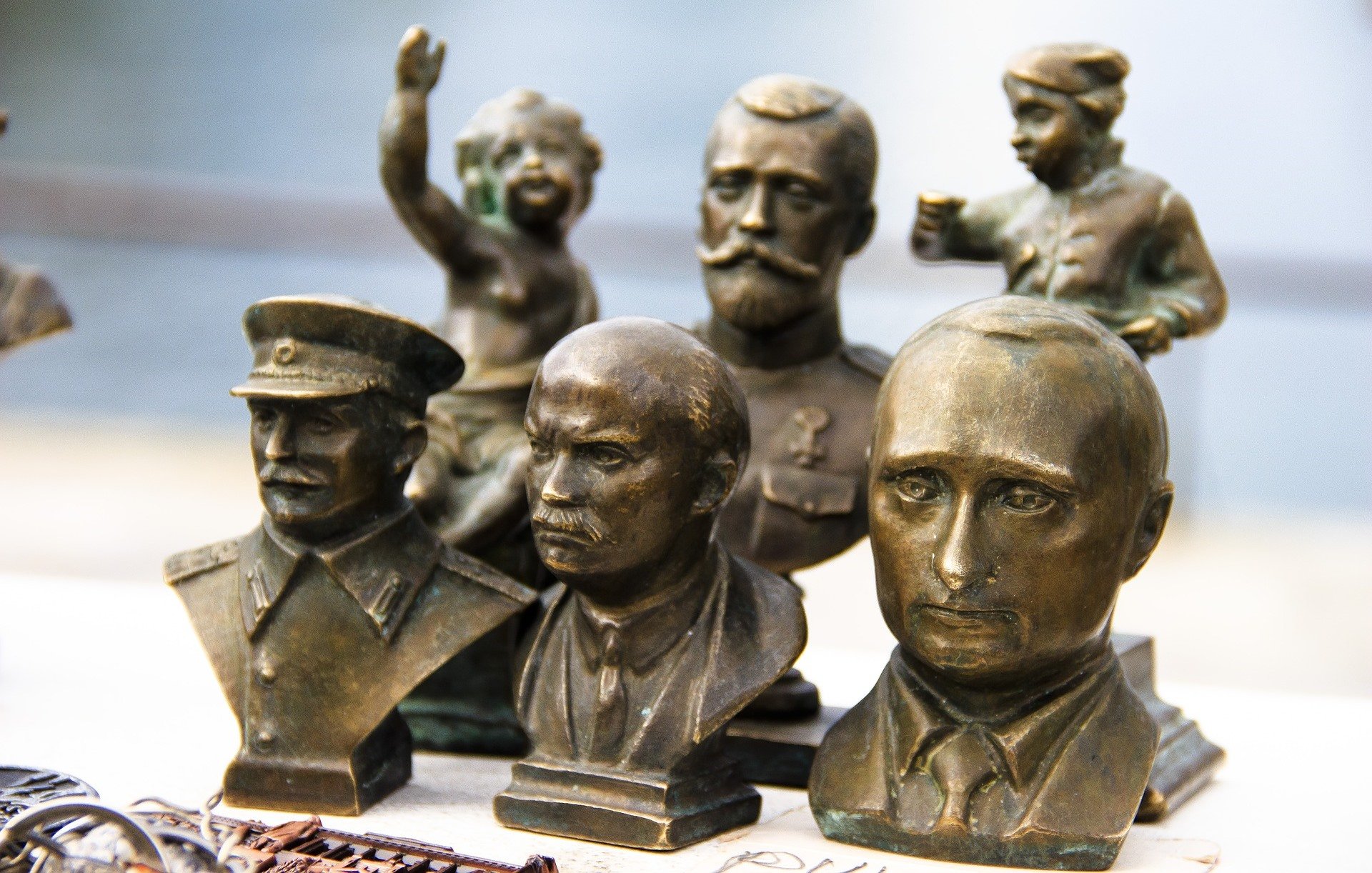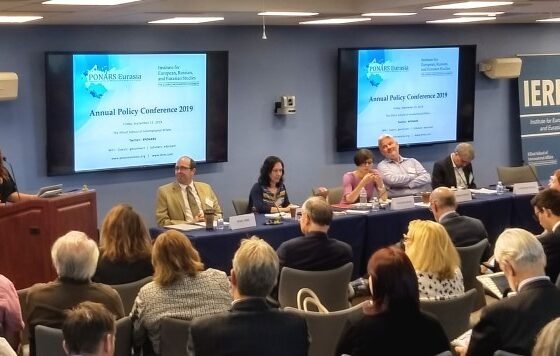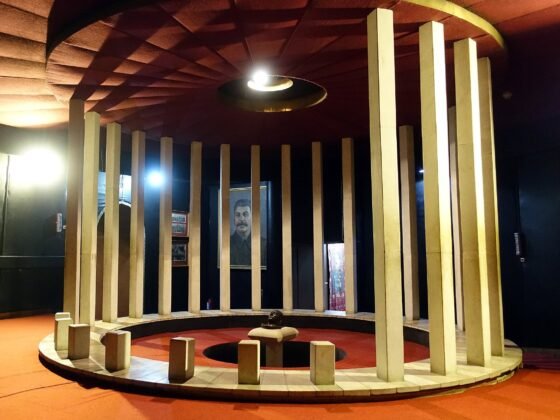Hardly anyone expected that the conflict between Russia and Ukraine, which has been going on since the 2004 Orange revolution one way or another, would turn into an actual war. However, an analysis of Russia’s memory politics, coupled with President Vladimir Putin’s desire to preserve his own power, made a direct military clash almost inevitable.
On the 24th of February, one day after celebrating the Day of the Defender, Russia launched a full-scale military invasion of Ukraine. From President Vladimir Putin’s official address just before the attack, it was possible to discern three official reasons behind this decision. First, the war happened “to prevent a potential threat to Russia from Ukraine,” which, according to Putin, was planning to join NATO and acquire nuclear weapons. Second, it was necessary “to stop the genocide of the Russian population in Ukraine.” Third, it was Russia’s “obligation” to provide military support to Ukraine’s separatist regions of Donetsk and Luhansk, which Moscow had just recognized as independent states.
Putin’s unofficial goal is to ensure that Ukraine remains within the orbit of Russia’s influence with a status similar to Belarus. But it is Russia’s memory politics—via Putin as the main campaign architect—that preordained the war against a country with which it shares centuries of common history, Orthodox religiosity, and Slavic roots.
A New Russian Identity
To understand how memory politics became such a decisive factor in the Russo-Ukrainian conflict, it is important to more granularly define the term. Memory politics can be understood as the official position of a country regarding historical events and their commemoration. This position, if shared by the population, forms a collective memory, which is the main component of collective identity. This connection between collective memory and collective identity is nicely defined by Russian scholar Anatoly Khazanov, Emeritus Professor of Anthropology at the University of Wisconsin-Madison. In his 2008 article, “Whom to Mourn and Whom to Forget? (Re)constructing Collective Memory in Contemporary Russia,” he writes: “Tell me what you want to remember, commemorate and forget, and I will tell you who you are.” In other words, to understand who today’s Russians are and why they support Putin, we need to know what and how they remember and commemorate, as well as what they try to forget.
When Putin came to power in 1999, Russia for already ten years had tried to live according to the rules of the liberal international order. These rules included the idea of being fair and showing remorse for past misdeeds, which had inflicted suffering on other people. President Boris Yeltsin was mindful of this aspect and willing to include reparations for Soviet crimes in his political agenda. According to another Russian scholar of collective memory, Alexei Miller, Yeltsin even kneeled in front of the monument to the victims of the Katyn massacre, which the Soviet Union had denied and blamed on Nazi Germany. Yeltsin recognized this crime committed by the Soviet Union and, as a leader of the successor state, took responsibility for making amends for the past for the sake of a positive future relationship between Russia and Poland. Similar repentance from the Russian government was expected by the Baltic States, Ukraine, and the Russian nation itself—they all suffered at the hands of the Soviet totalitarian regime. The Russian authorities in the 1990s were working in close collaboration with the NGO Memorial that worked on investigating and memorializing the crimes of totalitarianism.
The situation radically changed after Putin assumed power, first as a prime minister in 1999 and then as president in 2000. During his first term in office, Putin realized that being remorseful does not fit well with Russia’s pride, and he harnessed the concept of “glory” to build a new Russian identity. The first steps in this direction were made by revisiting commemoration and memorialization policies. Instead of repenting for the crimes committed by the Soviet Union, Putin suggested justifying them by the circumstances and necessity.
For this purpose, in 2007, a group led by Russian historians Aleksandr Filipov and Aleksandr Danilov wrote a new book on Russian and Soviet history from 1900 to 1945, which was intended to be the leading textbook for students and high school teachers in Russia. The book suggested focusing on the glorious past of the Russian and Soviet state and on its role in winning the Great Patriotic War (1941-1945). The book emphasizes the Soviet contributions to the war and the USSR’s role in the liberation of Europe. This latter point, reinforced by official rhetoric that mixes criminal slang with an aggressively dominant stance toward neighboring countries while emphasizing the achievements of the Putin era, became the focal point for the construction of a new Russian collective identity.[1]
The Kremlin went further. Reinstating an official version of history, Russia adopted legislation in 2014 that criminalized any “trials of rewriting history.” The amendments made to the Russian Criminal Code, in accordance with this so-called Yarovaya Law, made it punishable even to repost objectionable material on Facebook. Furthermore, just two days before the invasion, the Russian parliament introduced a bill attaching fines and prison sentences to a 2021 law banning “any public attempt to equate the aims and actions of the Soviet Union and Nazi Germany during World War II, as well as to deny the decisive role of the Soviet people in the victory over fascism.” The NGO Memorial and other NGOs that received external funding were labeled as “foreign agents,” a term that bears a very negative connotation in today’s Russia.
In brief, Putin’s government put much effort into constructing a new Russian identity by utilizing narratives about the Great Patriotic War and promoting the memories of Russian and Soviet glory. It also encourages obliterating the memory of shame for Soviet crimes against humanity. This identity has been reinvigorated, as Gulnaz Sharafutdinova puts it, by the entrenchment of an idea of the “besieged fortress,” which portrays Russia as a country surrounded by enemies. The success of memory politics is difficult to measure, but the fact that Putin’s popularity soared after the annexation of Crimea in 2014 demonstrates that it had an effect on a large percentage of the Russian population. This success is explicable by two interrelated factors: 1) a certain nostalgia that persisted and that was nurtured by Putin’s memory politics among the Russian population regarding the powerful position of the Soviet Union on the world stage, and 2) disappointment with liberal values from the 1990s and a negative or confrontational attitude toward the West. Both factors suggest that the Russian electorate is or was ready to trade some personal material comforts in exchange for greater Russian state power.
The Inevitability of a Clash
Russia’s official interpretation of history is, by default, confrontational toward Ukraine, Poland, and the Baltic States. Similar to the Russian Federation in the 1990s, these countries have been investigating the crimes of the totalitarian regimes that they suffered from. These investigations led to the condemnation of both Nazi and Soviet crimes during and after World War II and the equation of these regimes in terms of their violence and negative effects. Furthermore, they have criminalized the denial of their crimes and forbade the symbols of both. None of these steps were considered a problem by Russia up until Putin’s second term in office, when he started actively pursuing a new politics of memory. Eventually, opposition from the Russian side to the critical approach among East European countries ignited a conflict that reinforced Ukrainian political gravitation toward the West.
However, disagreements over differences in the memory politics of Ukraine within Russia could have stayed at a low level of intensity if not for one more element that also contributed to turning it into an actual war. This element is Putin’s goal to preserve his own power. To achieve this goal, he relies on memory politics that were partly informed and partly encouraged by the above-mentioned readiness of the Russian population to trade some of its well-being for the promised laurels.
Putin first detected this mood of the Russian electorate in the public support of his Chechen military campaign. Indeed, his firm grip in handling the Chechen war turned the then-unknown head of the FSB within three months into a politician who won a Russian presidential election and continued to do so throughout the 2000s. His answers to foreign journalists and politicians, which were rich in Russian criminal slang, resonated positively with domestic audiences. The population clearly desired a strong leader who could respond to critiques from the West the way that the Soviet leaders used to. This popular demand not only informed the construction of a new Russian identity based on “glory,” but it also trapped Putin, making him a hostage of his own memory politics.
To maintain his high popularity, Putin had to continue in the chosen direction, which also meant adding actions to words. After some time, his personal bravado, anti-liberal stance, and pseudo-patriotic rhetoric were not enough to keep his popularity high. The public was tired of the accumulating domestic economic problems and the immovable political elite, which had replaced the oligarchs of the 1990s. It did not believe in words and unfulfilled promises anymore. The annexation of Crimea solved the question of Putin’s popularity for some time, but the support of separatism in the eastern parts of Ukraine did not have the same positive effects as Crimea due to its longevity and lack of resolution. The stagnation of the Russian economy also was leading to growing protests among the electorate, and new success in world politics—a way to reassert Russia’s status in the world—was becoming a pressing priority.
Complaining vigorously about Ukraine’s potential admission to NATO, which was not a likely scenario, had the advantage of revising the post-1991 Soviet humiliation and showing that Russia now had to be taken seriously in world affairs. Following apparent military successes in Chechnya in the early 2000s, Georgia in 2008, Crimea in 2014, and Syria in 2015, Putin assumed it would be unproblematic to use the military to assert control over Ukraine. However, it was a gross miscalculation, considering the strategic importance of Ukraine for Europe, the size of the country, and the willingness of Ukrainians to fight. To many external observers, it seems incredible that Putin did not recognize Ukrainian’s commitment to their nation and state, but that his blindspot is a consequence of his political system.
Conclusion
Russian memory politics is based on two main principles: it cherishes the memory of Soviet glory and suggests obliterating the memory of shame. This memory politics led to a new Russian identity, which is based on the anti-liberal values of the Soviet era. The return to a Soviet-style collective identity constrained Putin’s choices in international politics. To maintain his own popularity and secure his position in power, he had to back his anti-Western rhetoric with actions. An efficient, victorious war in Ukraine, which does not have NATO protection, would suit the goal. However, Ukraine’s defiance coupled with the unified support of the West produced the opposite effect: Putin’s position is now more vulnerable than ever.
Marat Iliyasov is a Postdoctoral Research Fellow in the Department of Political Science at the Center for Russia, East Europe, and Central Asia (CREECA) at the University of Wisconsin-Madison.
[1] Also see: Ivan Kurilla, “Nationalizing Russian (War) Memory Since 2014,” PONARS Eurasia Policy Memo No. 659, July 2020; “Russia, My History”: History as an Ideological Tool,” Point & Counterpoint, August 2018; “The Return of Stalin”: Understanding the Surge of Historical Politics in Russia,” PONARS Eurasia Policy Memo No. 429, May 2016.











